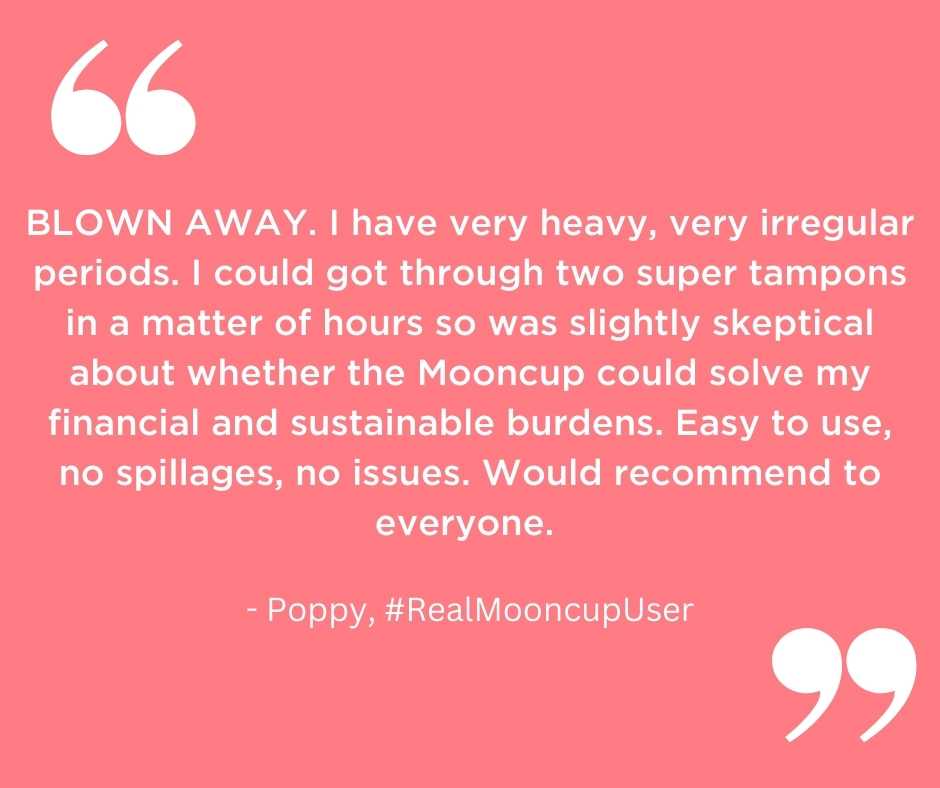How to manage heavy periods
Heavy periods – if you experience them you’ll know they can be inconvenient, painful and get in the way of exercise and being out and about.
But there’s no need to suffer in silence and you’re not alone. In fact, every year, 1 in 20 of us who menstruate consult our GP due to concerns about heavy periods.
Read on as our Mooncup Advice Team give us their top tips for how to manage heavy periods, along with the causes and symptoms.
All you need to know about how to manage heavy periods
Research suggests that the average amount of blood lost during a period is around 5-12 teaspoons (30-72mls). However everyone’s periods are different, and for many, losing more blood than this may not be unusual.
If you think that your periods are heavier than average, or have noticed an increase in bleeding, it’s best to explore why this is happening. This can help you understand your body better and take appropriate steps to deal with the problem.
What is a heavy period?
The medical term for heavy or prolonged bleeding during your menstrual cycle is ‘menorrhagia’. As many as 1 in 3 of us with periods would describe them as heavy. However, the bleeding may not be heavy enough to be medically classified as menorrhagia. The definition of ‘heavy periods’ is actually tricky to pin down, as it can vary by individual and by cycle. Some people may perceive their periods as being heavy because they experience leakage, but sometimes this can simply be due to their period product not working well for them- particularly if they experience sudden gushes or clots.
Research studies have historically defined heavy periods as ‘losing 80ml or more in each period, having periods that last longer than 7 days, or both’. While it can be hard to track how much blood you lose if you use absorbent products like tampons or pads, the Mooncup® has millilitre markings on the cup which can help you track your blood loss.

You may also have heavy periods if you:
- need to change your pad or tampon every 1 to 2 hours, or empty your menstrual cup more often than is recommended because it is full
- need to use 2 types of sanitary product together, such as a pad and a tampon
- have periods lasting more than 7 days
- pass blood clots larger than about 2.5cm (the size of a 10p coin)
- bleed through to your clothes or bedding
- avoid daily activities, like exercise, or take time off work because of your periods
- feel tired or short of breath a lot
What causes heavy periods?
There is no single reason for heavy periods. Lifestyle, as well as your diet, age or contraception, among other things can all play a role.
Your age
The age that you are may affect your periods. Teenagers are more likely to experience heavy and irregular periods in the first year of menstruation as their bodies get used to the changes and influx of hormones.
Perimenopause
On the flip side, those going through the perimenopause can also experience disordered and heavy bleeding. The Mooncup menstrual cup can be a great option at this time, as it collects menstrual fluid rather than absorbing it, meaning you can use it no matter how heavy or light your flow is.
Contraception
Your method of contraception is another piece of the period puzzle. Some hormonal contraceptive may reduce or stop your periods altogether, whereas others may cause heavier periods. For example, if you have a copper IUD (aka ‘the coil’) your periods may become heavier and longer. If your periods continue to be much heavier or longer after starting a new form of hormonal contraception, it’s best to speak to your GP or sexual health provider.
Stress
Stress can also have a big impact on your periods. This makes perfect sense when you consider how significantly stress can affect your whole body. Your menstrual cycle is regulated by hormones. However higher levels of stress-related hormones, such as cortisol, can upset this delicate balancev- leading to irregular, lighter or heavier periods.
Childbirth
It is common for your periods to change after having a baby, though everyone’s experience will be different. Once your periods return you may experience lighter or heavier periods, irregular periods, painful cramping, as well as small blood clots.
If your bleeding is much heavier than before, or you are having small blood clots during your period that last longer than a week, you should speak to your doctor.
Medical causes
There are a few different medical conditions that can cause heavy periods – we’ll look at some of these in a moment!
How to manage heavy periods, 4 ways
The good news is that there are ways to help you manage heavy periods. However, you should speak to your GP before making any decisions. It is likely they will want to run some tests, check your medical history, and rule out any underlying conditions before suggesting a solution.
1. Medical and alternative therapy options
There are a range of treatments available. The most suitable option for you will depend on your personal preference, medical history, and the likely cause of your heavy periods. Medical options include types of hormonal therapies, such as a hormonal contraceptive pill or the IUS. Other non-hormonal medications could also help. Ask your GP for more information about your options.
If you’re considering using an IUD or IUS alongside the Mooncup®, we would recommend you first discuss this with your IUD fitter or GP.
2. Herbal supplements
Some people report that certain herbal supplements, natural remedies or alternative therapies can help to reduce heavy periods and manage their symptoms. It’s best to discuss any alternative therapies or supplements that you’re considering with your GP as some supplements can interact with certain types of medication.
3. Exercise
Regular light exercise can often help with the symptoms of your period. We know that exercising can be the last thing you feel like doing on your period, but it doesn’t have to be an intense workout! Even gentle exercise can boost your endorphins to cope better with heavy periods.

4. Switch to the Mooncup
The Mooncup is a great option for those suffering from heavy periods. It’s reusable and you only need one, which means real monthly savings, especially if you’re having to change your tampons or pads often. The Mooncup also holds 3 x more than a regular tampon, so it will give you longer-lasting protection on those heavier days. Want some extra reassurance? Read what real Mooncup users with heavy periods have got to say.
7 reasons why the Mooncup® menstrual cup is the most comfortable product for heavy periods
- The Mooncup® holds 3 x as much blood as a regular tampon. This means you don’t have to empty it as often. We know this can be particularly handy for people working in protective gear or in shift work.
- You can wear the Mooncup® for up to 8 hours. Fewer bathroom visits, less need to plan your day around access to the toilet! We do recommend emptying your menstrual cup at least once every 8 hours though due to safety and hygiene reasons.
- You can see how much blood you lose. If you are worried about how heavy your periods are, it’s useful to be able to track the blood loss and share this information with your doctor.
- The non-absorbent Mooncup® respects your natural balance. It doesn’t cause irritation or leave fibres behind like tampons do.
- No more carrying bulky pads around. No last-minute dashes to the shops. You only need one Mooncup® menstrual cup!
- Squats or jumps – no problem! Unlike bulky pads or leaky tampons, the Mooncup® won’t stop you from exercising. When the Mooncup® is correctly inserted, you won’t even notice it’s there.
- Oh, all the money you will save! Those with an ‘average’ menstrual flow use around 300 disposable period products a year. Your reusable Mooncup® will last you years and years. Head to our savings calculator to find out how much you could save by making the switch!

Knowing your cycle
Everyone’s period is different, so having a heavy cycle isn’t necessarily a cause for concern. The best course of action is to keep track of your periods so you can get an overall picture of how they are for you. There are many period tracking apps out there to log the start and end date, quantity of blood, any related symptoms and any bleeding in between periods. Of course, a good old fashioned notebook or your phone calendar will do the trick too! Listen to your body and learn about your cycle so you can recognise any changes and take action.
When to see a doctor for your heavy periods
If you do feel that your periods may be too heavy, long or painful, it’s always best to seek the professional advice of your doctor. This also applies if you’ve noticed your periods have changed significantly recently.
Don’t feel nervous about booking an appointment to do something about heavy flow – remember 1 in 20 of those with periods do this in any given year! If you do decide to visit your doctor, they will most likely ask about your medical history, your usual period experience and how this impacts your life. This information can help your doctor to determine the reason behind your heavy periods. They may also perform a physical exam, and if appropriate may recommend you see a gynaecologist.
Medical reasons for heavy periods
There are a number of more serious causes for a heavy period. If you are concerned, keep a note of the frequency, duration and amount of blood loss you experience. You can do this by using the markings on your Mooncup as mentioned above, or by the number and type of tampons or pads you need to use.
Fibroids
Fibroids are non-cancerous growths that develop in or around the womb. They can cause painful or heavy periods.
Endometriosis
Endometriosis is a condition where tissue similar to the lining of the womb starts to grow in other places, such as in the pelvis, ovaries and fallopian tubes.
Hormone imbalance
Your menstrual cycle is regulated by hormones. A balance between the hormones oestrogen and progesterone control the growth of the lining of the uterus, which sheds during your period. If hormones become imbalanced (for example due to stress), the lining of the uterus can develop in excess and result in heavy periods. Heavy bleeding can also be a sign of an underlying thyroid condition that may be causing a hormonal imbalance.
Polycystic Ovarian Syndrome (PCOS)
PCOS is a common condition which affects how the ovaries work. It can cause irregular periods, and periods can sometimes be heavy when they restart.
Bleeding disorders
Although they are rare, certain bleeding disorders can lower the body’s ability to clot your blood and consequently result in abnormal periods. For example, conditions such as Von Willebrand’s Disease, a blood clotting disorder, can make it take longer for bleeding to stop.
Complications related to heavy periods: anaemia
Heavy periods (as well as normal periods on occasion) can cause anaemia; a reduction in red blood cells within the body. Symptoms of anaemia can include paleness, fatigue, ulcers on the side of the mouth or dizziness.
If you’re anaemic or suffer from heavy menstrual bleeding, your doctor might prescribe iron supplements or recommend including more iron-rich foods in your diet.
Did you know that we offer a unique Advice Service run by medical health professionals, who can be contacted with any Mooncup usage queries? Do not hesitate to get in touch with us regarding heavy periods and using a Mooncup. Here to help you make the switch.
Get to #knowyournormal. Find out more about the Mooncup and get yours here.
Read more on the Mooncup blog:
What is Endometriosis? Everything you need to know
The colour of you period: what does it mean?
What are the different types of vaginal discharge and what do they mean?
What are the five gynaecological cancers and their symptoms?
Why are we afraid of blood?
What is Premenstrual Dysphoric Disorder?







